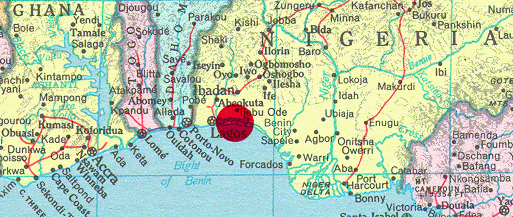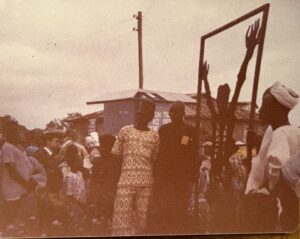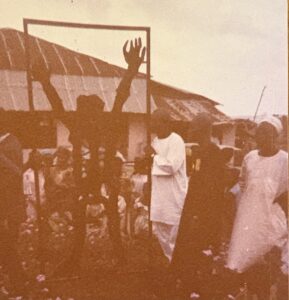



HIGHLIGHTS
AI NOTEBOOK LM DIALOGUE with related INFOGRAPH
“Reflections on Kawangware and Ijede At the Beginning”, Larry Loeppke, 2025
BACKGROUND
NAME ORIGIN: “Ijede” means “the place where men gather fish to eat”. Ijede derives its name from Ajede, the Yoruba chief who first settled this area some 250 years ago.
GEOGRAPHY: Ijede Town, located sixty kilometers northeast of Lagos, the capital of Nigeria. Situated at the end of a newly tarred road, and built on a low-lying laterite clay shelf, Ijede overlooks the Lagos Lagoon.
POPULATION: Ijede is the capital of a small kingdom with a population of about seven thousand located in the Ikorodu Division of Lagos State. Thirty villages and compounds, the largest of which is IJede Town, are scattered across the forty three square mile landscape. The villages along the coast of the Lagos Lagoon depend mostly on fishing. The inland villages grow cocoa, maize, coconuts, palm oil, cassava, vegetables and spices.
The residents of Ijede were traditional fishermen who were being drawn into modern vocations and the urban life of Lagos. The area also has a tradition of iron-working and construction. Ijede is a town of colorfully dressed, proud and gregarious people who welcome visitors with festive songs and dances. The farming and fishing of the area was done mostly for local consumption, while timber and cocoa are the major sources of outside income. In order to meet the challenge of meshing the rich heritage of the ancient kingdom with modern rapid development, Ijede re-established the traditional role of the ruling Oba who is final decision-maker for the community along with five ruling families and nine chiefs.
CHALLENGES: Focus was to accelerate economic expansion, promote physical services, and encourage social self-reliance.
ACCOMPLISHMENTS
By 1980 the people of Ijede celebrated the following accomplishments:
- The establishment of a sewing factory employing 30 tailors has brought 10 families back from urban centers and supports social services for the whole village.
- A fishing industry, block factory, and poultry farm have been established for employment and diet improvement.
- Construction has been initiated on 147 new buildings and public lighting system has been installed.
- The village’s identity has been re-established with the construction of an entry way to the village including: 75 Royal Palm trees, huge welcome sign, iron man, bulletin board, bus stop shelter, and speed bumps.
- Five Children’s Club run by community teachers provide education and nutritious food to 3-5 year olds in each of the neighborhoods.
- Health and sanitation have been improved with the training of 19 health advocates, creation of a rubbish disposal system, weekly community clean-ups, vaccinations and health and hygiene education.
DOCUMENTS
- The Spirit Movement in Nigeria, James Addington, Chicago, September 5, 1975
- Welcome to Ijede article, 1980
- Ijede HDP Update, January 1 – September 1, 1978
- Ijede Sewing Industry Report, 1978
- Ijede HDP First Quarter Report, March 1977
- Ijede Brochure Introducing Project, 1977
- Ijede HDP article, 1977
- Ijede Human Development Project Report, 1977
- Ijede HDP Consultation Summary Statement, January 1977
